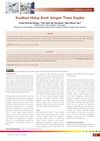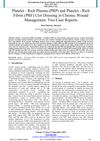 4 citations,
July 1996 in “Annals of Internal Medicine”
4 citations,
July 1996 in “Annals of Internal Medicine” High doses of fluconazole can cause reversible hair loss.
 3 citations,
August 2022 in “Curēus”
3 citations,
August 2022 in “Curēus” The SARS-CoV-2 vaccine may be linked to triggering autoimmune conditions like Alopecia Areata.
 3 citations,
January 2008 in “Actas dermo-sifiliográficas/Actas dermo-sifiliográficas”
3 citations,
January 2008 in “Actas dermo-sifiliográficas/Actas dermo-sifiliográficas” Early diagnosis and treatment of Hidradenitis Suppurativa are important to prevent serious physical and mental effects.
 2 citations,
February 2023 in “Transgenic Research”
2 citations,
February 2023 in “Transgenic Research” The E2 protein affects gene activity in hair follicles of mice.
 2 citations,
January 2018 in “European journal of pediatric surgery reports”
2 citations,
January 2018 in “European journal of pediatric surgery reports” A baby girl's hair turned straight on one side due to a neck tumor and surgery, but it returned to curly as she recovered.
 1 citations,
October 2023 in “Clinical, cosmetic and investigational dermatology”
1 citations,
October 2023 in “Clinical, cosmetic and investigational dermatology” Traditional treatment for pediatric alopecia areata is most effective and should be first choice.
 1 citations,
June 2021 in “Journal of dermatology and dermatitis”
1 citations,
June 2021 in “Journal of dermatology and dermatitis” Tyrosine kinase inhibitors show promise in treating some skin diseases but their definitive role in dermatology is still unclear.
 1 citations,
January 2019 in “Skin appendage disorders”
1 citations,
January 2019 in “Skin appendage disorders” A woman's sudden hair loss three years after a bone marrow transplant was a sign of chronic graft-versus-host disease but improved with treatment.
 1 citations,
June 2017 in “Journal of the American Academy of Dermatology”
1 citations,
June 2017 in “Journal of the American Academy of Dermatology” Oral tofacitinib may be an effective and tolerable treatment for some people with severe alopecia areata.
 1 citations,
January 2015 in “Side effects of drugs annual”
1 citations,
January 2015 in “Side effects of drugs annual” The document concludes that various dermatological treatments and drugs can cause skin reactions and side effects.
 1 citations,
July 2012 in “Springer eBooks”
1 citations,
July 2012 in “Springer eBooks” The document concludes that more research is needed to better understand and treat scarring hair loss conditions.
 1 citations,
April 2006 in “Seminars in Reproductive Medicine”
1 citations,
April 2006 in “Seminars in Reproductive Medicine” Androgen therapy might help some women with low libido, but it has risks and should be used carefully.
 1 citations,
November 1953 in “Archives of Dermatology”
1 citations,
November 1953 in “Archives of Dermatology” The document discusses various challenging skin conditions and their treatments.
 1 citations,
January 2020 in “Benha Journal of Applied Sciences”
1 citations,
January 2020 in “Benha Journal of Applied Sciences” Certain gene variations may increase the risk and severity of alopecia areata.
 1 citations,
July 2016 in “Cosmetics”
1 citations,
July 2016 in “Cosmetics” Black henna tattoos can cause severe allergies to hair and textile dyes, and there's a need for greater public awareness and regulation.
 1 citations,
March 2010 in “Internal medicine journal”
1 citations,
March 2010 in “Internal medicine journal” A 72-year-old man with sudden taste issues and hair growth was diagnosed with a severe stomach cancer and died within 5 months.
 1 citations,
February 2004
1 citations,
February 2004 Skin diseases are common and can significantly affect people's lives; better outcome measures and ethical clinical trials are needed to improve dermatology care.
 May 2024 in “Research Square (Research Square)”
May 2024 in “Research Square (Research Square)” PCOS increases sexual pain distress in infertile women.

A 9-year-old girl developed type 1 diabetes and alopecia after being treated for a rare kidney disease.
 April 2024 in “Journal of asthma and allergy”
April 2024 in “Journal of asthma and allergy” Abrocitinib effectively treated severe atopic dermatitis and mild alopecia areata in a 12-year-old boy after dupilumab failed.
 March 2024 in “Clinical, cosmetic and investigational dermatology”
March 2024 in “Clinical, cosmetic and investigational dermatology” Upadacitinib may effectively treat alopecia areata without side effects.
 January 2024 in “Dermatology practical & conceptual”
January 2024 in “Dermatology practical & conceptual” Male gender and family history predict alopecia areata recurrence.

New insights into cell communication in psoriasis suggest innovative drug treatments.
 December 2023 in “Communications biology”
December 2023 in “Communications biology” Targeting the HEDGEHOG-GLI1 pathway could help treat keloids.
 November 2023 in “Cermin Dunia Kedokteran”
November 2023 in “Cermin Dunia Kedokteran” Tinea capitis can affect mental health, but treatment improves both health and well-being.
 October 2023 in “Research Square (Research Square)”
October 2023 in “Research Square (Research Square)” Oxidative stress is linked to mild patchy alopecia areata.
 October 2023 in “Clinical medicine and medical research”
October 2023 in “Clinical medicine and medical research” Thyroid function may influence hair loss after COVID-19.
 September 2023 in “International Journal of Science and Research (IJSR)”
September 2023 in “International Journal of Science and Research (IJSR)” PRP and PRF can effectively heal chronic wounds.
 January 2023 in “Bio web of conferences/BIO web of conferences”
January 2023 in “Bio web of conferences/BIO web of conferences” The document concludes that specific dermoscopic features can help diagnose different facial red skin conditions.
 January 2023 in “European endocrinology”
January 2023 in “European endocrinology” People with alopecia have a higher risk of thyroid cancer.






























